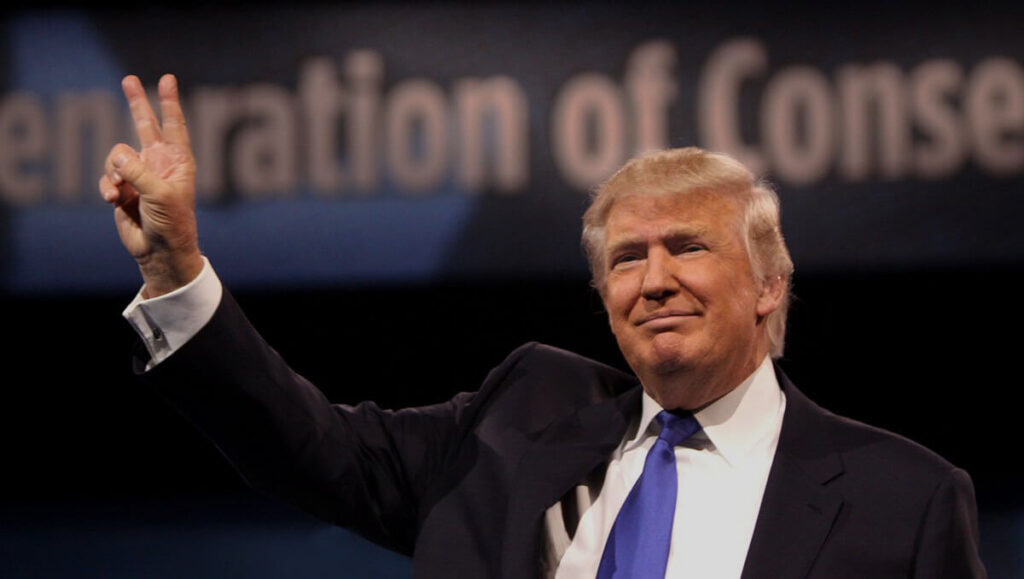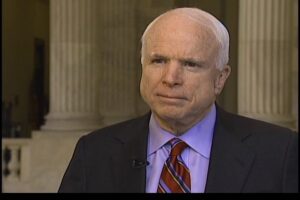Lunacy, Bluster & Unanswered Questions: Trump On Defense
Posted on
Sen. John McCain, a stalwart defense Republican, has come out against GOP presidential candidate Donald Trump, saying he shares the concerns expressed today by fellow former GOP presidential Mitt Romney and 65 GOP national security leaders “about Mr. Trump’s uninformed and indeed dangerous statements on national security issues….
“At a time when our world has never been more complex or more in danger, as we watch the threatening actions of a neo-imperial Russia, an assertive China, an expansionist Iran, an insane North Korean ruler, and terrorist movements that are metastasizing across the Middle East and Africa, I want Republican voters to pay close attention to what our party’s most respected and knowledgeable leaders and national security experts are saying about Mr. Trump, and to think long and hard about who they want to be our next Commander-in-Chief and leader of the free world,” McCain says in a statement.
Since Trump will again take to the airwaves this evening to again debate America’s future and his role in it, it seems a propitious moment to run this op-ed by former OMB defense guru Mark Cancian of the Center for Strategic and International Studies. Read on. Take some aspirin. Pray for your country. This is the fourth in our series about the budgetary and policy implications of the 2016 presidential candidates. The Editor.
Even though there is almost no data to crunch from the Trump campaign, it’s time to examine what a Trump defense program might look like because he appears to be the presumptive Republican nominee. As one might expect, Trump has broken all the policy conventions in describing a defense program in the same way he has broken all the political rules to achieve his primary victories so far. He is causing huge discomfort in the Republican national security community.
There’s not much to go on at the Trump website, just a 23-second description of his defense program. Verbatim, it is: “I’m going to make our military so big, so powerful, so strong that nobody, absolutely nobody, is going to mess with us. We’re going to take care of our veterans. We’re going to get rid of ISIS and were going to get rid of them fast.”
In addition, Trump has made statements in interviews and in the debates, so there is some track record to analyze.
What we have is a combination of mainstream policy goals (for the GOP since he is seeking the Republican nomination, after all), bluster (exaggeration for effect), sheer lunacy, and a lot of unanswered questions. Let’s look at four areas that Trump himself has highlighted: the defense budget, veterans, ISIS, and burden sharing with allies.
Increasing the Defense Budget
What the mainstream GOP says: strengthening America’s defenses is widely shared. All the Republican candidates have advocated it.
Trump Bluster. The notion that “no one will mess with us” is a fine sentiment but we all understand (I hope) that it cannot be achieved. History is full of examples where powerful nations were attacked because they were unable to be supremely powerful in all dimensions at all times.
Trump Lunacy. Trump criticized the budget deal of 2015 as “showing absolutely no budget discipline” and for “burden[ing] our children and grandchildren with debts they will never be able to repay”. He did not exempt defense spending from his criticism. Yet this budget deal saved defense from deep cuts, which would have undermined the goal he advocates of strengthening national defense.
Trump unanswered questions. How big a military does he want? Sen. Ted Cruz, for example, has proposed a program that would add about $140 billion per year to the defense budget. During the Cold War the military was sometimes asked what a “low risk force” to achieve national security goals would entail. The answer was something on the scale of World War Two. Is this what Trump has in mind?
Improving Veterans Treatment
What the mainstream GOP says. The notion of supporting veterans is a bipartisan goal shared widely in the political establishment. Veterans affairs is one area, in national security the only area, where Trump has a detailed policy paper. His notion of improving management by firing “incompetent” executives is consistent with recent congressional action to give the VA more tools to shape its workforce.
Trump Bluster. “The VA program is a disaster…Fire the corrupt and incompetent VA executives that let our veterans down.”
Trump lunacy. Trump’s paper says that he will, “Ensure our veterans get the care they need wherever and whenever they need it. No more long drives. No more waiting for backlogs.” With expansive rhetoric like this as a baseline, all VA programs will fall short, creating further disappointment in the veteran community at ever higher cost.
Trump unanswered questions. The Obama administration brought in a new secretary with a proven management record in the private sector (Robert McDonald, former CEO of Procter and Gamble). How would Trump further improve top management? If he wants to run the VA like a commercial activity, how would he exempt it from the many requirements of the civil service and government activities? If he wants to give veterans more choices, for example in the private sector, how would he handle the greatly increased costs as more veterans take advantage of this benefit and how would he shut down parts of the Veterans Administration that would now not be used?
Defeating Daesh (ISIL)
What the mainstream GOP says. The notion of defeating Daesh is widely shared. All of the Republican candidates have expressed similar sentiments. Even Obama has said that he would “destroy” Daesh.
Trump Bluster. Getting rid of Daesh “fast” is impossible. No insurgency is defeated rapidly.
Trump lunacy. Trump proposes to squeeze Daesh revenues by bombing Iraqi oil facilities. However, this would alienate the Iraqi government, which we are trying to prop up, and cripple its postwar reconstruction.
Trump unanswered questions. How will he achieve this rapid victory? The Obama administration’s approach of airstrikes, some boots on ground, and support to local allies has produced some progress – Ramadi has been retaken and the attack on Mosul has begun – but it has been very slow. Would Trump deploy US forces to produce a quick ground victory? That’s likely the only really fast mechanism, but that would contravene Trump’s repeatedly expressed reservations about foreign interventions.
And what would he do about Daesh in Syria? Would he really send that US troops into that civil war?
Making Allies Pay More
What the mainstream GOP says. Making allies pay more for the common defense has been a bipartisan US policy goal since the creation of NATO. The US has always carried a greater burden terms of percentage of GDP and has sought to ease that burden and enhance security by having allies increase their effort.
Trump bluster. “Charging” allies for defense services.
Trump lunacy. Trump has said that he would take $1.5 trillion in oil from Iraq to pay for US war costs. At current oil prices, this would strip Iraq of all its oil revenues for 30 years. Since Iraq would never agree to this, we’d need to physically seize the oil, a clearly unacceptable action (I hope).
Trump unanswered questions. Perhaps some of those famous Trump negotiation skills will work here, even though 25 years of post-Cold War efforts by numerous American negotiators has not moved the Europeans much. In fact, the US share of NATO spending has ballooned from 50 percent to 75 percent since 2001. In the case of the Japanese (and Koreans) there is a big downside: what if they say, no thank you, we’ll provide our own defense, including a nuclear capability. The last time the Japanese built a large independent military produced tragic results of which we are all well aware. How would Trump avoid alienating the allies?
The notion that presidential candidates might be a bit vague in their campaign promises is certainly not a radical one. Neither the Clinton campaign nor the Rubio campaign have provided detailed national security programs, so in this Trump is not alone. What’s new is the bluster, the unabashed extremism of some of his sentiments, and the many unanswered questions left, well, unanswered.
Mark Cancian, a former top defense budget analyst at the Office of Managment and Budget under President Obama, is a defense analyst at the Center for Strategic and International Studies.
Subscribe to our newsletter
Promotions, new products and sales. Directly to your inbox.


